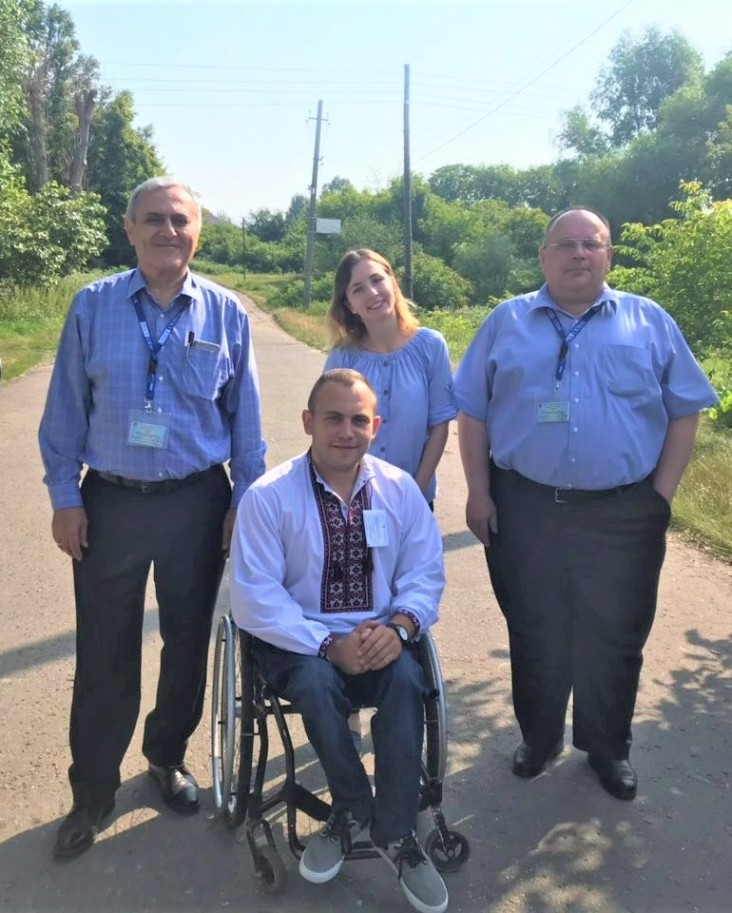Speeches Shim

In July 2019, ahead of the July 21 Verkhovna Rada (Parliament) elections in Ukraine, Roman Humeniuk decided to contribute to change in his community by chairing the Precinct Election Commission (PEC) in the Lviv Oblast village of Kurovichi. This considerable task was complicated by the fact that polling stations and public buildings in Ukraine are often not accessible, and Humeniuk uses a wheelchair.
"I like challenges and enjoy having new experiences," said Humeniuk. "These were my first elections I [participated] in outside of my home and the first when I was among those who organized the elections."
For Humeniuk, participating in the electoral process also provides an opportunity to set an example for other youth and people with disabilities. He hopes to inspire these populations to participate in the democratic development of their country.
People with disabilities are often excluded from public and political life in Ukraine as a result of situational barriers, such as inaccessible public places and buildings. According to research conducted by the National Assembly of People with Disabilities with support from the United States Agency for International Development (USAID), only 19 out of 145 polling stations in three Ukrainian cities are accessible to those with disabilities. Humeniuk believes improving access for people with disabilities who wish to vote in person at polling stations could be a first step in breaking down stigma and increasing their participation in the political process.
“Being able to vote directly at the polling station could have a positive impact on the social adaptation of people with disabilities,” he said. “After all, Election Day is the best opportunity for people with disabilities to feel their meaningful role in society.”
When Humeniuk first became PEC Chairperson, he was unable to access the polling station where he was supposed to work as it was housed in an old village hall that did not have an accessible ramp. As Chairperson, Humeniuk took matters into his own hands and successfully petitioned local authorities to install a ramp in order to address this issue.
Successfully overseeing an accessible environment to work and vote was particularly empowering to Humeniuk who was accustomed to being overlooked in these situations. In addition to overcoming this personal obstacle, Humeniuk has also advanced his political leadership skills by learning more about Ukraine’s complicated electoral legislation, which mandates a parallel election system. In July 2019, he participated in a cascade training program for 33,000 Precinct Election Commissioners from all over Ukraine organized by the Central Election Commission and the International Foundation for Electoral Systems (IFES), with support from USAID. The training program increased participants’ knowledge of electoral law, voting procedures and PEC responsibilities during the electoral process.
“Since I have never been involved in elections before, I received a lot of new information during the training,” Humeniuk said. “In particular, I learned a lot of nuances about the procedure for holding PEC meetings and counting the votes that helped me on Election Day.”
On Parliamentary Election Day – July 21, 2019 – Humeniuk and his PEC colleagues successfully administered a range of election procedures and shared their experiences with election observers from the Organization for Security and Cooperation in Europe’s Office for Democratic Institutions and Human Rights (OSCE/ODIHR).
Despite challenges related to administrative procedures Humeniuk faced while serving as PEC Chair, he says he would gladly participate in another election.
“If I have the opportunity, I would like to [serve] at the next level of the election process. For instance, in the role of a member of the District Election Commission,” Humeniuk said.
IFES will continue to support community leaders like Humeniuk in learning more about elections while ensuring a more accessible electoral environment for people with disabilities.
In cooperation with local civil society organizations and ongoing support from USAID, IFES works to strengthen institutions to improve the accessibility of the elections for all stakeholders and empower disenfranchised groups to effectively participate in electoral and political processes. For more information, visit ifesukraine.org.

Comment
Make a general inquiry or suggest an improvement.